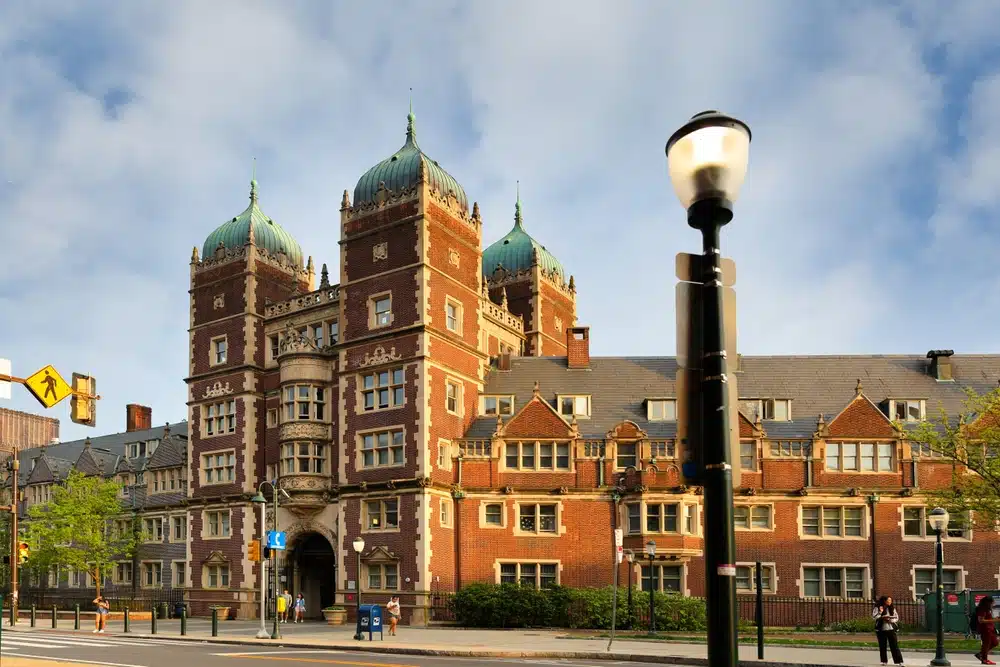A Look at the UPenn Class of 2025 Statistics
Admission to the University of Pennsylvania (UPenn) is a landmark achievement, signifying the culmination of years of hard work and dedication. For the Class of 2025, that acceptance letter is a testament to their remarkable academic and extracurricular accomplishments. This article delves into the various statistics that paint a holistic picture of the UPenn Class of 2025.
Understanding the Admission Process
Before we examine the demographics and statistics of the incoming class, it is essential to understand UPenn’s rigorous admission process. Known for its selective and highly competitive process, UPenn seeks to admit students who excel academically and demonstrate a strong commitment to co-curricular and community activities.
UPenn’s admission process is designed to identify individuals who will thrive in its intellectually stimulating and diverse community. The university carefully evaluates each applicant’s academic achievements, extracurricular involvement, leadership potential, and personal qualities.
When reviewing applications, UPenn considers many factors beyond grades and test scores. The admissions committee looks for students who have taken on challenging coursework, showing a willingness to push themselves academically. They also value applicants who have positively impacted their communities through volunteering, leadership positions, or involvement in clubs and organizations.
Admission Criteria for UPenn
At the core of its admission process, UPenn values academic prowess, demonstrated through grades, course rigor, and standardized test scores. However, the university also emphasizes the importance of leadership experience, community engagement, and a distinct academic passion in its holistic evaluation.
UPenn recognizes that academic excellence alone does not guarantee success in college or life. Therefore, they seek students with leadership potential and a genuine commitment to making a difference in their communities. This commitment can manifest in various ways, such as initiating social impact projects, organizing fundraisers, or actively participating in community service.
Letters of recommendation, a personal essay, and a supplemental essay provide crucial insights into an applicant’s character, intellectual curiosity, and potential contributions to the UPenn community. Hence, these components also play a significant role in the admission decision-making.
Through letters of recommendation, UPenn gains valuable perspectives from teachers, mentors, and community leaders who have interacted closely with the applicants. These letters shed light on an applicant’s personal qualities, work ethic, and growth potential.
The personal essay allows applicants to showcase their unique experiences, perspectives, and aspirations. It allows self-reflection and storytelling, enabling the admissions committee to understand the applicant’s motivations, values, and goals.
Additionally, the supplemental essay prompts applicants to delve deeper into their academic interests and how they align with UPenn’s programs and resources. This essay allows applicants to demonstrate their research on the university and articulate their reasons for choosing UPenn as their academic home.
Changes in the Admission Process for 2025
For the class of 2025, UPenn introduced some changes to its admission process, largely driven by the COVID-19 pandemic. Adopting a test-optional policy for SAT and ACT scores was one of the main deviations due to the testing challenges during the pandemic.
The test-optional policy aimed to alleviate the stress and limitations caused by test center closures and the cancellation of test dates. This change allowed applicants to decide whether to submit their test scores, giving them the flexibility to present their strengths in other application areas.
Despite these changes, competition for admission remained as fierce as ever, attesting to UPenn’s enduring appeal to bright, ambitious students across the globe. The university continues to attract a diverse pool of applicants who are passionate about their academic pursuits and eager to contribute to the UPenn community.
UPenn’s commitment to holistic evaluation ensures that each applicant is evaluated comprehensively, considering their unique circumstances and achievements. The admissions committee carefully considers the qualities and experiences that applicants bring to the table, aiming to create a vibrant and intellectually stimulating community of scholars.
Breakdown of the Class of 2025
Now that we understand UPenn’s admission process let’s unpack some details about the incoming Class of 2025.
The Class of 2025 at UPenn is an exceptional and diverse group of individuals who bring a wide range of experiences and perspectives to the university. This class truly reflects UPenn’s commitment to fostering a culturally diverse and inclusive campus.
Demographics of the Incoming Class
UPenn takes pride in its ability to attract students from various ethnic, socio-economic, and geographical backgrounds, and the Class of 2025 statistics are a testament to this commitment. The incoming class comprises students from all corners of the globe, representing a rich tapestry of cultures and traditions.
About half of the admitted students identify as persons of color, further supporting UPenn’s dedication to maintaining a multicultural student body. This diversity enhances the academic environment and promotes a vibrant and inclusive campus community where students can learn from one another’s unique perspectives.
In addition to its ethnic diversity, the UPenn Class of 2025 statistics include many first-generation college students. These individuals, the first in their families to pursue a higher education, bring a fresh and inspiring perspective to the university. Their presence serves as a reminder of the transformative power of education and the opportunities that UPenn provides.
Academic Achievements of the Class of 2025
The academic accomplishments of the Class of 2025 are nothing short of impressive. These students have demonstrated exceptional dedication and commitment to their studies, earning them a place among UPenn’s prestigious incoming class.
Most admitted students rank in the top 10% of their high school class, showcasing their intellectual prowess and academic excellence. Their outstanding achievements in the classroom are a testament to their hard work, discipline, and intellectual curiosity.
Although UPenn adopted a test-optional policy for this year, many students chose to submit their SAT or ACT scores. This decision reflects their confidence in their academic abilities and desire to showcase their readiness for UPenn’s rigorous educational experience. These scores serve as an additional measure of their academic preparedness and highlight their commitment to academic excellence.
The academic achievements of the Class of 2025 not only demonstrate their capabilities but also contribute to the overall academic environment at UPenn. Their intellectual curiosity and passion for learning will undoubtedly enrich classroom discussions and collaborative projects, fostering a vibrant academic community.
Major Choices of the Class of 2025
Delving deeper into academic interests, let’s explore the popular major choices among the incoming students.
Choosing a major is important for college students, as it sets the foundation for their future careers and academic pursuits. The Class of 2025 at UPenn is no exception, with students carefully considering their options and selecting majors that align with their passions and goals.
Most Popular Majors
Historically, the most popular majors at UPenn are within the realms of Business, Social Sciences, and Biological & Biomedical Sciences. This trend continues with the Class of 2025, as these areas of study continue to attract a significant number of students.
The Wharton School of Business, especially known for its esteemed Bachelor of Science in Economics program, has once again captured the attention of a significant portion of the class. The program’s rigorous curriculum and renowned faculty members provide students with a solid foundation in business principles and prepare them for success in the corporate world.
Within the Social Sciences, majors such as Psychology, Political Science, and Sociology remain popular among incoming students. These disciplines offer a deep understanding of human behavior, societal structures, and political systems, allowing students to analyze and contribute to our world’s complex issues.
In Biological & Biomedical Sciences, students are drawn to majors such as Biology, Biochemistry, and Neuroscience. With advancements in medical research and a growing interest in understanding the human body and its functions, these majors provide students with the knowledge and skills to pursue careers in healthcare, research, and academia.
Emerging Majors in the Class of 2025
Notably, there has been a growing interest among the Class of 2025 in areas such as Data Science and Environmental Science. The rise in such selections underscores the class’s desire to tackle globally significant issues, such as climate change and digital transformation.
Data Science, a multidisciplinary field that combines statistics, computer science, and domain knowledge, has gained popularity due to the increasing importance of data analysis in various industries. Students who choose this major will develop skills in data manipulation, visualization, and predictive modeling, positioning themselves for careers in data-driven decision-making and innovation.
Environmental Science, on the other hand, reflects the class’s commitment to addressing the pressing environmental challenges of our time. This interdisciplinary field encompasses the study of the environment, its ecosystems, and the impact of human activities. Students pursuing this major will gain a deep understanding of environmental issues and contribute to developing sustainable solutions.
These nuanced shifts in major preferences speak to the evolving intellectual frontier of the incoming students. The Class of 2025 at UPenn is driven not only by traditional disciplines but also by emerging fields that reflect our society’s changing needs and priorities.
Geographic Distribution of the Class of 2025
The geographic distribution of the Class of 2025 offers a glimpse into the diverse regional backgrounds that individual students bring to campus. This diversity enriches UPenn’s academic and cultural environment, fostering a vibrant and inclusive community.
Let’s look at the statistics regarding the geographic distribution of domestic and international students in the Class of 2025.
Domestic Students Statistics
Most domestic students hail from the Northeast region of the United States, with states like New York, New Jersey, and Massachusetts contributing many students. This concentration of students from the Northeast is unsurprising, considering UPenn’s proximity to major metropolitan areas like New York City and Philadelphia.
However, despite this regional concentration, the Class of 2025 represents all 50 states, showcasing UPenn’s national appeal. Students from states as diverse as California, Texas, Florida, and Illinois have chosen UPenn as their academic home, bringing unique perspectives and experiences.
California and Texas, in particular, have strong representations in the Class of 2025. These states, known for their vibrant economies and diverse populations, extend UPenn’s influence beyond the Ivy League’s traditional East Coast stronghold. The presence of students from these states further enhances UPenn’s reputation as a globally recognized institution.
International Students Statistics
UPenn’s global reach continues to expand, as evidenced by the international student population in the Class of 2025. The university’s commitment to fostering a global perspective is reflected in the diverse nationalities represented among international students.
Top contributing countries to the international student population include China, India, South Korea, and Canada. These countries have a rich history of academic excellence and cultural diversity, and their students bring unique perspectives and experiences to UPenn’s campus.
The increasing global presence on campus reinforces UPenn’s position as a renowned global academic institution. The university’s commitment to attracting talented students from around the world enriches the educational experience for all students and strengthens UPenn’s global network and impact.
As the Class of 2025 comes together, the geographic distribution of students highlights the university’s commitment to diversity, inclusion, and global engagement. The diverse backgrounds and experiences of the students contribute to a vibrant and intellectually stimulating community where ideas are exchanged, cultures are celebrated, and lifelong friendships are formed.
Financial Aid and Scholarships
UPenn remains committed to making education accessible to all. Financial aid and scholarships form a crucial aspect of the university’s admission process.
Overview of Financial Aid Packages
The aid package offered to admitted students reflects UPenn’s commitment to meet 100% of the demonstrated financial need of its students. The comprehensive aid program includes grants, work-study opportunities, and low-interest loans.
These packages made it possible for students in the class of 2025 to afford a UPenn education, regardless of their family’s financial circumstances.
Scholarships Awarded to the Class of 2025
In addition to need-based financial aid packages, many students in the Class of 2025 also received merit-based scholarships. These scholarships reflect recognition of their outstanding academic and co-curricular accomplishments.
Such scholarships enable UPenn to attract and retain the brightest minds globally, ensuring a vibrant academic culture.
The UPenn Class of 2025 statistics comprises a diverse, hard-working, and academically-achieving student body set to impact their respective fields of study. These promising students are the future flag-bearers of UPenn’s tradition of excellence.
If you want to discuss the UPenn class statistics to a greater extent or inquire about college admissions, look no further! Our experts here at AdmissionSight can help you! Here at AdmissionSight, we have over a decade’s worth of experience guiding students through the competitive admissions process to get accepted to the top universities in the world. Feel free to set up an appointment today to book your initial consultation.









































